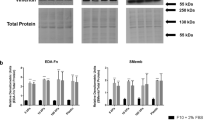Abstract
THE synthesis of collagen has been examined in cultures of various cell strains and established cell lines of fibroblastic origin1–5. All the strains and most of the established lines synthesized considerable quantities of collagen, but the rate of synthesis varied among the different strains and lines4,6. One line, 3T3, in contrast to others evolved from the same initial mouse embryo culture, was found to be severely restricted in its ability to synthesize collagen2,7, while transformants of this line produced by polyoma virus or SV40 were able to synthesize collagen at higher rates7. It therefore appeared that collagen synthesis in cell line 3T3 was repressed and this repression was released by the viral transformation.
This is a preview of subscription content, access via your institution
Access options
Subscribe to this journal
Receive 51 print issues and online access
$199.00 per year
only $3.90 per issue
Buy this article
- Purchase on Springer Link
- Instant access to full article PDF
Prices may be subject to local taxes which are calculated during checkout
Similar content being viewed by others
References
Merchant, D. J., and Kahn, R. H., Proc. Soc. Exp. Biol. and Med., 97, 359 (1958).
Goldberg, B., Green, H., and Todaro, G. J., Exp. Cell Res., 31, 444 (1963).
Green, H., and Goldberg, B., Nature, 204, 347 (1964).
Green, H., and Goldberg, B., Proc. Soc. Exp. Biol. and Med., 117, 258 (1964).
Castor, C. W., and Muirden, K. D., Lab. Invest., 13, 560 (1964).
Green, H., and Goldberg, B., Proc. U.S. Nat. Acad. Sci., 53, 1360 (1965).
Todaro, G. J., Goldberg, B., and Green, H., Proc. U.S. Nat. Acad. Sci., 51, 66 (1964).
Eagle, H., Oyama, V. I., Levy, M., and Freeman, A. E., J. Biol. Chem., 226, 191 (1957).
Bortrie, A. L., Huffman, C. F., and Duncan, C. W., J. Dairy Science, 25, 983 (1942).
Robertson, W. Van B., and Schwartz, B., J. Biol. Chem., 201, 689 (1953).
Peterkofsky, B., and Udenfriend, S., Proc. U.S. Nat. Acad. Sci., 53, 335 (1965).
Shimizu, Y., McCann, D. S., and Keech, M. K., J. Lab. and Clin. Med., 65, 286 (1965).
Todaro, G. J., and Green, H., Science, 147, 513 (1965).
Earle, W. R., and Nettleship, A., J. Nat. Cancer Inst., 4, 213 (1943).
Sanford, K. K., Hobbs, G. L., and Earle, W. R., Cancer Res., 16, 162 (1956).
Todaro, G. J., Wolman, S. R., and Green, H., J. Cell Comp. Physiol., 62, 257 (1963).
Hamerman, D., Todaro, G. J., and Green, H., 101, 343 (1965).
Author information
Authors and Affiliations
Rights and permissions
About this article
Cite this article
GREEN, H., TODARO, G. & GOLDBERG, B. Collagen Synthesis in Fibroblasts transformed by Oncogenic Viruses. Nature 209, 916–917 (1966). https://doi.org/10.1038/209916a0
Issue Date:
DOI: https://doi.org/10.1038/209916a0
This article is cited by
-
Cell type–specific extracellular matrix guided the differentiation of human mesenchymal stem cells in 3D polymeric scaffolds
Journal of Materials Science: Materials in Medicine (2017)
-
Mechanical forces regulate the interactions of fibronectin and collagen I in extracellular matrix
Nature Communications (2015)
-
Transforming growth factor beta and the cell surface in tumor progression
Cancer and Metastasis Reviews (1993)
-
Fibroblastlike primary cells from human colon adenocarcinoma explants: Collagen biosynthesis
In Vitro Cellular & Developmental Biology - Animal (1991)
-
Regulation of a collagen gene promoter by the product of viral mos oncogene
Nature (1985)
Comments
By submitting a comment you agree to abide by our Terms and Community Guidelines. If you find something abusive or that does not comply with our terms or guidelines please flag it as inappropriate.



